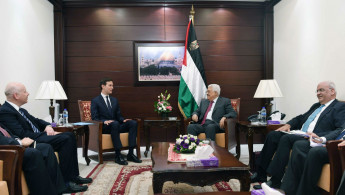Trump may abandon Israeli-Palestinian peace talks after ‘tense’ meeting
US President Donald Trump is reportedly considering abandoning Israeli-Palestinian peace negotiations following a "tense" meeting between senior adviser Jared Kushner and Palestinian president Mahmoud Abbas in Ramallah this week.
Together with Trump's Middle East envoy Jason Greenblatt, Kushner met both Abbas and Israeli Prime Minister Binyamin Netanayhu this week in talks described by US officials as "productive."
A report in London-based Arabic daily Al-Hayat, however, quoted a senior Palestinian official as saying talks between Kushner and Abbas were "tense", with Abbas furious that US officials had demanded that the PA stop payments to the families of Palestinian attackers.
Abbas accused the US officials of taking Israel's side, the report said, adding that Israel is using the payments issue as a pretext to avoid entering negotiations.
The US delegation also criticised Abbas after he refused to meet with the US ambassador to Israel, David Friedman, due to his pro-settlement stance.
"They sounded like Netanyahu's advisers and not like fair arbiters," a senior Palestinian official told Haaretz following the meeting.
Kushner will now submit a report to Trump, who will then decide if there is a chance for negotiations or whether it is "preferable to pull out of peace talks", the senior Palestinian official told Al-Hayat.
A senior US administration official described the report as "nonsense", according to the Jerusalem Post.
The report also claims that the Trump administration was upset that Abbas failed to denounce a stabbing attack in Jerusalem which killed an Israeli border policewoman.
Three Palestinians were shot dead following the attack.
A Palestinian delegation is expected to visit Washington next month to continue dialogue with the US, the report added.
In discussion with Greenblatt before Kushner's visit, Palestinian sources said the phrase "two-state solution" had not been used, Reuters reported.
In February, Trump appeared to break with decades of US policy on the two-state solution, saying: "I'm looking at two-state and one-state, and I like the one that both parties like".





 Follow the Middle East's top stories in English at The New Arab on Google News
Follow the Middle East's top stories in English at The New Arab on Google News


